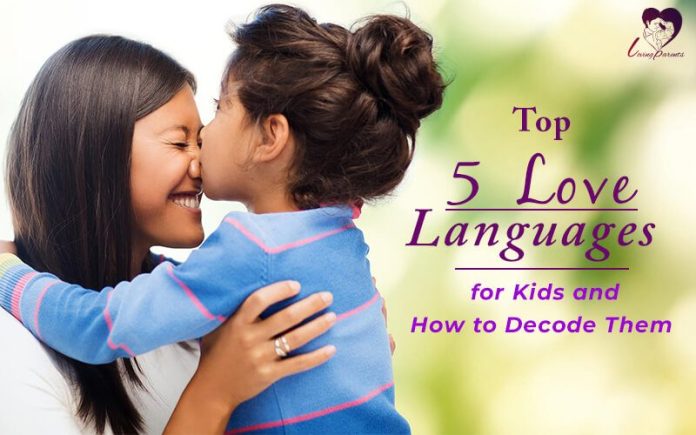As soon as I entered home after my one-week away corporate field trip, my five-year-old son looked at me and went away. He is the kind of kid that any mother would love to have – quiet and obedient to be a good student in the class but fun enough to be friends with almost everyone. But this particular weekend, he had been behaving like a brat. Firstly, I couldn’t understand why but then I realized that he was feeling a little low on the love tank from me. So, I went over to him and told him that I loved him and he again ran away from me. Even the presents that I had bought for him from my trip couldn’t sway his mood. But when I tried again and hugged him and kissed him, his mood shifted completely. While this wasn’t the only tantrum, I had seen that day, my eight-year-old daughter forgave me for being away when I gave her the presents. Both of these kids are mine and both have a different language of love that they understand. So, what are these 5 love languages for kids and how to decode them to understand and love your kids better? Well, read on.
5 Love Languages for Kids and How to Use Them
1. Physical Touch – “Come, hug me! Chase me!”

Have you heard these words coming from their mouths every day? Does your physical touch like hugging, kissing or holding hands make them smile instantaneously? If your children are constantly in your space and want to be touched all the time, well, physical touch might be the language of love for your child.
You can offer them hugs, kisses or snuggle with them on the couch. A secret handshake, three squeezes on the hand to say I love you can be ways to show your love towards them. You can engage in sports which include jostling. A common pitfall that comes with children whose language of love is physical touch; spanking or physical beatings can be harmful and might hurt them more.
Though this might be the prominent language of love for your kid, make sure you never stop telling them that you love them unconditionally.
2. Gifts – “Thank you for the present!”

If your child’s eyes gleam with joy every time someone gives him a present, we are looking at someone who loves receiving and giving gifts and considers them his language of love. There can be other signs as well to decode this as a love language. Try asking these questions – does your child collects and keeps all the gifts he has received even though he might not have looked at it in ages? Or does he remember every gift he has ever received from you and other friends and relatives? You have found your child’s language of love – gifts.
Though we all love receiving gifts but for a child like that, these presents show how much you love them. It is not important how big the gift is, sometimes bringing something that reminds you of them or something they had mentioned that day could bring a joyous smile on their faces. For example, bringing a beautiful stone or a flower or pretty leaves from the walks and leaving them on your child’s pillow to find them can make them feel loved and adored. While showering your kids with gifts is an easy way to show your love, make sure that you follow a fine line between speaking one of the 5 love languages for kids and spoiling them with presents.
If you are on the receiving end of gifts from them, make sure you create a keepsake box or display them prominently to show care towards your children.
3. Words of Affirmation – “Talk to me!”

Do your child beams and jumps with happiness when you tell him that he is the best in the world or give a nice compliment? Does your child often express his love by telling you that you are the best mommy or daddy in the world? Then the words of affirmation are the love language of your child.
To make sure that you are fulfilling the love-tank of such a child, share kind and loving words on daily. You can leave love notes in their lunch boxes telling them that you love them. Sometimes, you can whisper words of appreciation to a toy or a friend telling them something your child did. Psychology says that we believe words we overhear more than the words which are told to us directly.
With kids who find words of affirmation and appreciation as their language of love, insults and harsh comments might affect them deeply. Also, associating I love you with any other phrases like, I love you when or I love you if you are a good boy can have negative effects. This is a love language test as these children would want to know that you love them unconditionally and therefore would like to hear I love you standing alone rather than associated with a condition.
4. Acts of Service – “Mommy, could you do this for me?”

If your child has been asking you to do things for him then he appreciates thoughtful gestures and has acts of service as the language of love. This is one of the most common 5 love languages for kids. They may ask you to help them with even the tiniest of things like helping them put on pants every morning or fluffing their pillows every time they go to sleep. As parents, we all go above and beyond to help our kids and take care of their every need. But as they grow up, it is important to help these kids go through a process to become self-reliant as well. You certainly don’t have to jump at every request and make sure that you ask them to do certain tasks themselves to become capable individuals.
5. Quality Time – “Daddy, come play with me!”

If every time you enter the house and your kid ask you to play with him or watch his favorite cartoon on television, he is demanding quality time from you.
You can create a special time with your kids where you allow them to choose the activity, they want to do with you. Doing this would make them feel important to you. Give them your undivided attention while spending time with them by unplugging yourself from devices like phones, which competes for our attention constantly.
While doing so, you also don’t have to forgo your to-do-list. You can be near them and read your book as they play as they feel the warmth of your presence.
The Bottom Line
Each child is different and has a different love language test. To decode their language of love, make sure you observe them carefully. Children behave in a way where they showcase what they need from us by showing us the same language of love from their end. Stay tuned to their needs in specific moments, and you will stay connected to them by loving them in their language of love.


[…] Technology has changed the way we live and made our life’s easier and comfortable. Besides, it has also changed the parenting techniques of the modern era. Right from sending virtual hugs and kisses to teaching them using online videos, parenting has taken a form of a new language. […]
[…] Limits and empathy go hand-in-hand […]